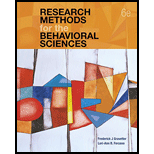
Concept explainers
Compare and contrast the nonscientific methods for knowing or acquiring knowledge (tenacity, intuition, authority, the rational method, and the empirical method). Identify an example and explain the limitations of each method.
Consider the following questions.
Does multitasking make you more efficient with your time?
Does having more friends make you less vulnerable to depression?
Are children of divorced parents less likely to be satisfied with their romantic relationships?
Are girls more likely to cyberbully than boys?
Does eating cake for breakfast make dieters more likely to stick to their diets later in the day?
Are adolescents who play violent video games more aggressive than adolescents who do not play violent video games?
Does playing brain games in adulthood make it less likely you will develop Alzheimer’s?
Compare and differentiate the non-scientific methods for acquiring knowledge. Identify an example and explain the limitation of each method.
Answer to Problem 1LO
Solution:
Scientific method means a stepped and logically fixed process for acquiring knowledge and understanding knowledge. The method of acquiring knowledge which is not scientific is termed as non-scientific.
Explanation of Solution
The non-scientific method does not have logically set procedures. The non-scientific ways of obtaining knowledge are explained as under -
- Tenacity:
- Intuition:
- Authority:
- Rational Method:
- Empirical Method:
Tenacity means what has been true in the past holds firmly to the belief and is expressed as "it has always been so".
Intuition means that something which just stands to reason. It involves use of rational processes with the experience benefit.
Authority means the process of established belief based on the prominent source.
It states that truth is intellectual. The process of rational decision making involves the consideration to all factors which are affected.
It is a method wherein knowledge is acquired through one's own experience and learning.
Example of non-scientific method to acquire knowledge is the speeches of the politicians − Authority.
Limitations of each method:
- Tenacity:
- Intuition:
- Authority:
- Rational Method:
- Empirical Method:
It does not support evaluation.
It means belief from within. Belief is unsupported by objective evidences.
The established belief on which it is based may be wrong.
It can construct logical arguments for both sides of debate. Hence, it cannot be completely relied upon.
While using this method, it is difficult to be an objective observer.
Want to see more full solutions like this?
Chapter 1 Solutions
Research Methods for the Behavioral Sciences (MindTap Course List)
Additional Math Textbook Solutions
Elementary Statistics (13th Edition)
Basic Business Statistics, Student Value Edition
Algebra and Trigonometry (6th Edition)
Elementary and Intermediate Algebra: Concepts and Applications (7th Edition)
Elementary Statistics: Picturing the World (7th Edition)
Probability And Statistical Inference (10th Edition)
- A well-known company predominantly makes flat pack furniture for students. Variability with the automated machinery means the wood components are cut with a standard deviation in length of 0.45 mm. After they are cut the components are measured. If their length is more than 1.2 mm from the required length, the components are rejected. a) Calculate the percentage of components that get rejected. b) In a manufacturing run of 1000 units, how many are expected to be rejected? c) The company wishes to install more accurate equipment in order to reduce the rejection rate by one-half, using the same ±1.2mm rejection criterion. Calculate the maximum acceptable standard deviation of the new process.arrow_forward5. Let X and Y be independent random variables and let the superscripts denote symmetrization (recall Sect. 3.6). Show that (X + Y) X+ys.arrow_forward8. Suppose that the moments of the random variable X are constant, that is, suppose that EX" =c for all n ≥ 1, for some constant c. Find the distribution of X.arrow_forward
- 9. The concentration function of a random variable X is defined as Qx(h) = sup P(x ≤ X ≤x+h), h>0. Show that, if X and Y are independent random variables, then Qx+y (h) min{Qx(h). Qr (h)).arrow_forward10. Prove that, if (t)=1+0(12) as asf->> O is a characteristic function, then p = 1.arrow_forward9. The concentration function of a random variable X is defined as Qx(h) sup P(x ≤x≤x+h), h>0. (b) Is it true that Qx(ah) =aQx (h)?arrow_forward
- 3. Let X1, X2,..., X, be independent, Exp(1)-distributed random variables, and set V₁₁ = max Xk and W₁ = X₁+x+x+ Isk≤narrow_forward7. Consider the function (t)=(1+|t|)e, ER. (a) Prove that is a characteristic function. (b) Prove that the corresponding distribution is absolutely continuous. (c) Prove, departing from itself, that the distribution has finite mean and variance. (d) Prove, without computation, that the mean equals 0. (e) Compute the density.arrow_forward1. Show, by using characteristic, or moment generating functions, that if fx(x) = ½ex, -∞0 < x < ∞, then XY₁ - Y2, where Y₁ and Y2 are independent, exponentially distributed random variables.arrow_forward
- 1. Show, by using characteristic, or moment generating functions, that if 1 fx(x): x) = ½exarrow_forward1990) 02-02 50% mesob berceus +7 What's the probability of getting more than 1 head on 10 flips of a fair coin?arrow_forward9. The concentration function of a random variable X is defined as Qx(h) sup P(x≤x≤x+h), h>0. = x (a) Show that Qx+b(h) = Qx(h).arrow_forward
 Glencoe Algebra 1, Student Edition, 9780079039897...AlgebraISBN:9780079039897Author:CarterPublisher:McGraw Hill
Glencoe Algebra 1, Student Edition, 9780079039897...AlgebraISBN:9780079039897Author:CarterPublisher:McGraw Hill Holt Mcdougal Larson Pre-algebra: Student Edition...AlgebraISBN:9780547587776Author:HOLT MCDOUGALPublisher:HOLT MCDOUGAL
Holt Mcdougal Larson Pre-algebra: Student Edition...AlgebraISBN:9780547587776Author:HOLT MCDOUGALPublisher:HOLT MCDOUGAL Big Ideas Math A Bridge To Success Algebra 1: Stu...AlgebraISBN:9781680331141Author:HOUGHTON MIFFLIN HARCOURTPublisher:Houghton Mifflin Harcourt
Big Ideas Math A Bridge To Success Algebra 1: Stu...AlgebraISBN:9781680331141Author:HOUGHTON MIFFLIN HARCOURTPublisher:Houghton Mifflin Harcourt
 Linear Algebra: A Modern IntroductionAlgebraISBN:9781285463247Author:David PoolePublisher:Cengage Learning
Linear Algebra: A Modern IntroductionAlgebraISBN:9781285463247Author:David PoolePublisher:Cengage Learning




